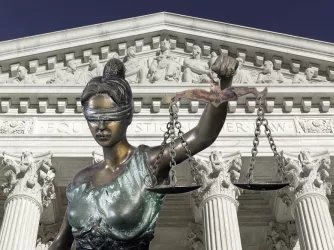Table of Contents
Washington State University Bankrolls Vigilante Censorship
PULLMAN, Wash., July 18, 2005—In a shameful distortion of the First Amendment, Washington State University has morally and financially supported disruptive heckling and threats at a controversial student play.
Washington State went so far as to pay for hecklers to attend student playwright Chris Lee’s Passion of the Musical. It then allowed the hecklers to repeatedly disrupt the musical through shouts and threats of violence. Washington State’s president later defended the hecklers’ behavior as a “responsible” exercise of free speech.
“Students have a right to leave a play, protest outside of the theater, and condemn a play in the newspaper. But they do not have the right to obstruct and censor other students’ protected expression,” remarked David French, president of the Foundation for Individual Rights in Education (FIRE), which has intervened on Lee’s behalf. “Washington State’s defense of this vigilante censorship will encourage students to unlawfully silence others whenever they feel offended.”
On April 21, 2005, Lee and his student cast performed the final production of Passion of the Musical, a play they had widely publicized as being potentially “offensive or inflammatory to all audiences.” During the play, a group of 40 student protestors repeatedly stood up, shouted about being offended, and verbally threatened audience members and the cast. FIRE has obtained a document confirming that administrators at Washington State’s Office for Campus Involvement (OCI) purchased the hecklers’ tickets.
The disruptions were so severe that at one point, Lee requested that campus security remove the hecklers from the audience. Campus security refused, instead asking Lee (who is African American) to censor part of his production by changing the word “black” to “blank” in the satirical song “I Will Do Anything for God, But I Won’t Act Black” in order “to avoid a possible riot or physical harm.”
Lee later complained of this censorship to Washington State’s Center for Human Rights (CHR) and other administrators. CHR’s May 13 report justified the disruptions as protected expression, claiming that because the play provoked and “taunted” the audience, it exhibited “qualities of a public forum.” Washington State President V. Lane Rawlins was quoted in the campus paper as saying that the protestors “exercised their rights of free speech in a very responsible manner by letting the writer and players know exactly how they felt.”
“Washington State’s ‘public forum’ excuse is so ridiculous I don’t think even they believe it,” commented Greg Lukianoff, FIRE’s director of legal and public advocacy. “Does this mean that any time a play addresses the audience, it becomes a public forum? Under this theory, every soliloquy in Shakespeare would turn a theater into a discussion hall. Everyone knows what a play is—and that the audience does not have the right to disrupt it or to threaten the cast.”
Interestingly, the same office that bankrolled the hecklers at Passion of the Musical sponsored Washington State’s 2005 production of The Vagina Monologues. Washington State also played host in April to Tales of the Lost Formicans, in which a cast member simulated masturbating into the American flag. Washington State called that play “a whimsical look at the idiosyncrasies of human interaction” and promoted it via a university press release.
“Clearly, Washington State does not treat equally all plays that some might find offensive,” Lukianoff observed.
On June 17, FIRE wrote President Rawlins to request that Washington State renounce its support of a “heckler’s veto” over constitutionally protected expression. President Rawlins’ June 20 response to FIRE was a non-answer in which Rawlins claimed that the university was “committed to everyone’s exercise of all their human rights at WSU, including free speech, without fear of unlawful obstruction by anyone.”
FIRE reiterated its request on July 1, reminding Rawlins that “Washington State is a public university bound by the First Amendment of the U.S. Constitution and therefore may not tolerate, let alone support, attempts to disrupt, silence, and censor a theatrical work.” On July 14, a local paper reported that Rawlins responded to FIRE without withdrawing his support for the hecklers, but FIRE as yet has received no such response.
“As Lee said in a recent article, ‘The whole point [of the play] was to show people we’re not that different, we all have issues that can be made fun of,’” noted Lukianoff. “The very function of satire and parody is to challenge, provoke, and, yes, offend. If Washington State is not comfortable with this, it is not comfortable with the idea of free speech.”
FIRE is a nonprofit educational foundation that unites civil rights and civil liberties leaders, scholars, journalists, and public intellectuals from across the political and ideological spectrum on behalf of individual rights, due process, freedom of expression, academic freedom, and rights of conscience at our nation’s colleges and universities. FIRE’s efforts to preserve liberty on campuses across America can be viewed at thefire.org.
CONTACT:
David French, President, FIRE: 215-717-3473; david@thefire.org
Greg Lukianoff, Director of Legal and Public Advocacy, FIRE: 215-717-3473; greg@thefire.org
V. Lane Rawlins, President, Washington State University: 509-335-6666; rawlins@wsu.edu
Recent Articles
FIRE’s award-winning Newsdesk covers the free speech news you need to stay informed.

LAWSUIT: Videographers sue to overturn National Parks Service arbitrary permit scheme

Supreme Court must halt unprecedented TikTok ban to allow review, FIRE argues in new brief to high court

Australia blocks social media for teens while UK mulls blasphemy ban
